Redditor Refuses To Take Her Dog To Vet Because Its Tummy Issues Are Caused By Food Her Family Is Feeding It
Owning a dog can be one of the most rewarding experiences you'll ever have because dogs have an incredible ability to form strong bonds with humans, and they are known for their loyalty, love, and affection. One of the most important things to consider when owning a dog is providing them with proper care and attention.
This includes providing them with nutritious food, regular exercise, and proper grooming. Regular vet check-ups and vaccinations are also essential to keep them healthy, while training and obedience classes can be a great way to bond with your dog and ensure they have proper manners.
If your dog has any additional issues, like separation anxiety, it becomes even harder to take care of your dog properly because now there are many other things you have to keep in mind. This story, posted on Reddit, is about what happens when people disregard a pet's special needs, even though the owner pointed it out plenty of times.
OP's brother and mother moved in with her and her boyfriend, bringing OP her dog, Hank, who had been living with them for the past nine months because her late father wanted to live with him for a while. Hank has a sensitive stomach and sensitive skin, so there are some things that he can't eat without experiencing stomach issues.
Despite this, her brother came home with a bone for Hank, which OP knew he couldn't have, and despite her protests, her brother and grandmother allowed Hank to eat it. This resulted in Hank getting liquid diarrhea and an upset stomach, which lasted for days.
OP did everything she could to alleviate Hank's symptoms, but her mother insisted that she take him to the vet, despite knowing that it wasn't necessary and that it was her brother and grandmother's fault that this happened.
OP turned to Reddit in an attempt to see if she did the wrong thing in this situation, so make sure you scroll down and see what the people of Reddit had to say.
OP has enough on her plate as it is since she goes to school, works full-time, and she's 38 weeks pregnant
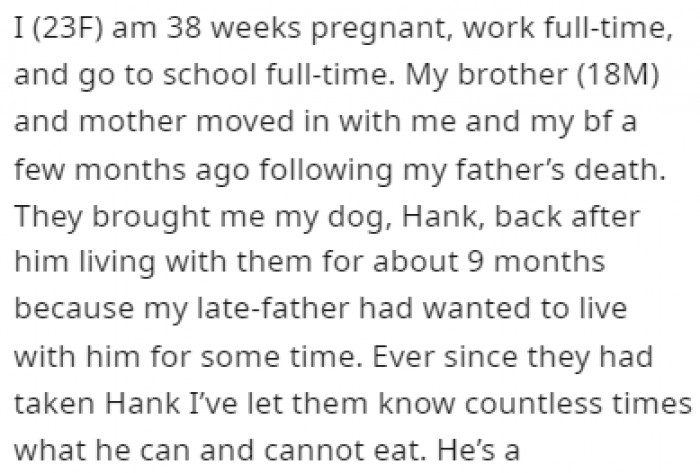
Hank is a Bulldog/Boxer mix with a sensitive stomach, so they need to be careful when feeding him
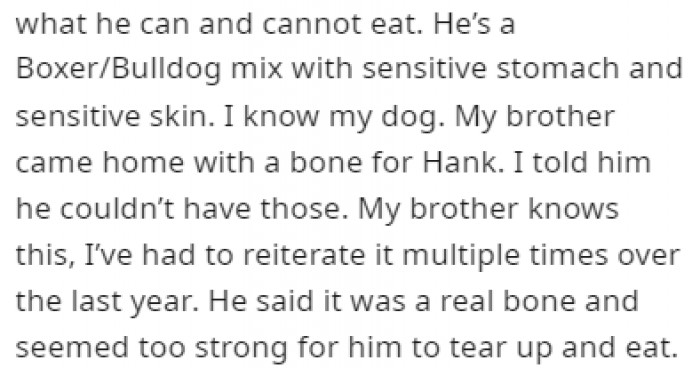
OP was hesitant to let Hank play with the bone her brother brought for him, but she believed that everything would be fine
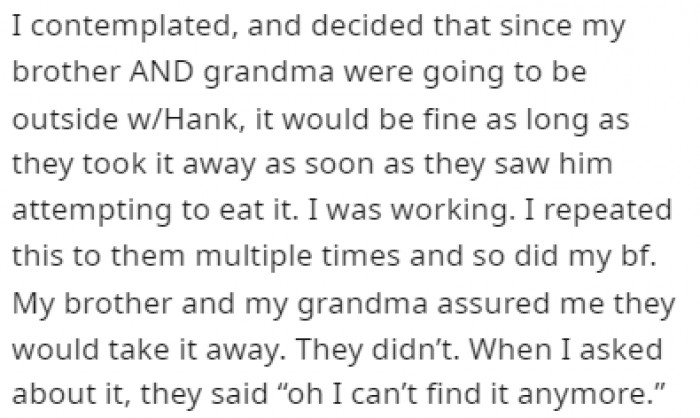
Understanding Sensitivity in Pets
Dr. Alan Foster, a veterinary behaviorist, notes that dogs with sensitive stomachs require careful dietary management to ensure their health and well-being.
Research indicates that a dog's diet can significantly impact their behavior and overall health, making it crucial for owners to be aware of their pets' specific needs.
This situation highlights the importance of clear communication among family members regarding pet care responsibilities.
Understanding the Impact of Diet on Canine Health
Diet plays a crucial role in a dog's overall health and well-being. Research indicates that food allergies or sensitivities can lead to significant gastrointestinal issues, which are often overlooked by pet owners. According to studies published in the Journal of Veterinary Internal Medicine, understanding the individual dietary needs of pets is essential for their long-term health.
The Redditor's concerns about the family feeding their dog unsuitable food highlight the importance of communication in pet care, particularly when it comes to dietary restrictions.
It's clear that OP is the only one who actually cares about the dog's well-being
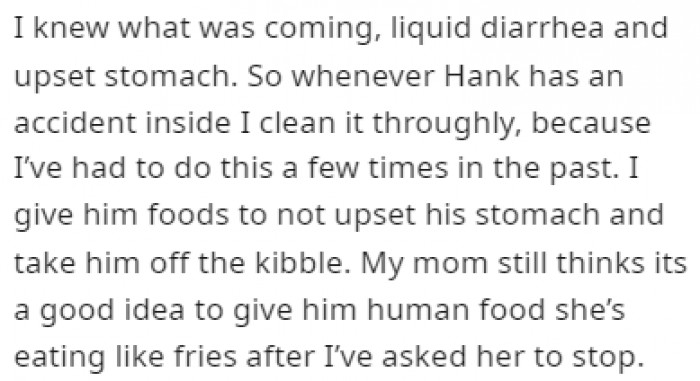
OP's mom told her that she needs to take him to a vet
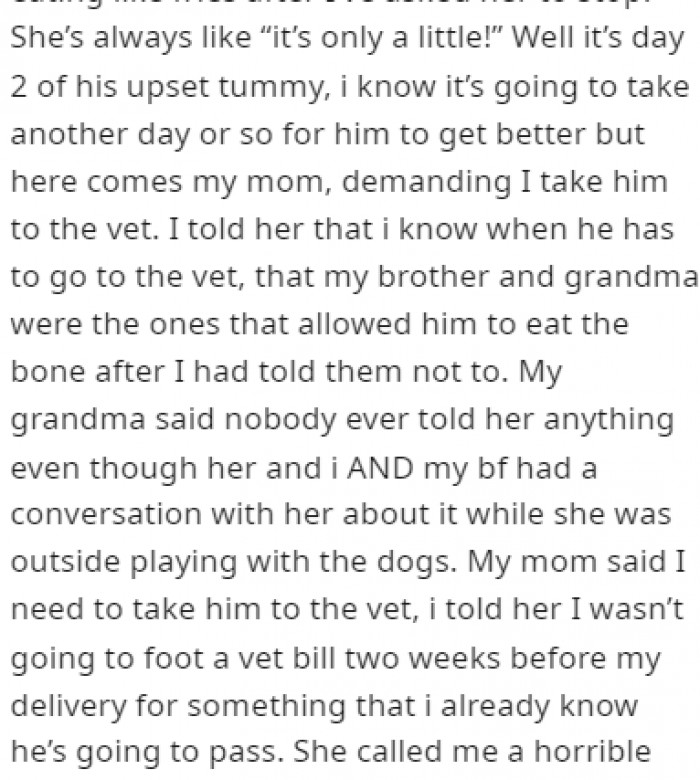
OP doesn't want to spend the money needed to get Hank checked by a vet
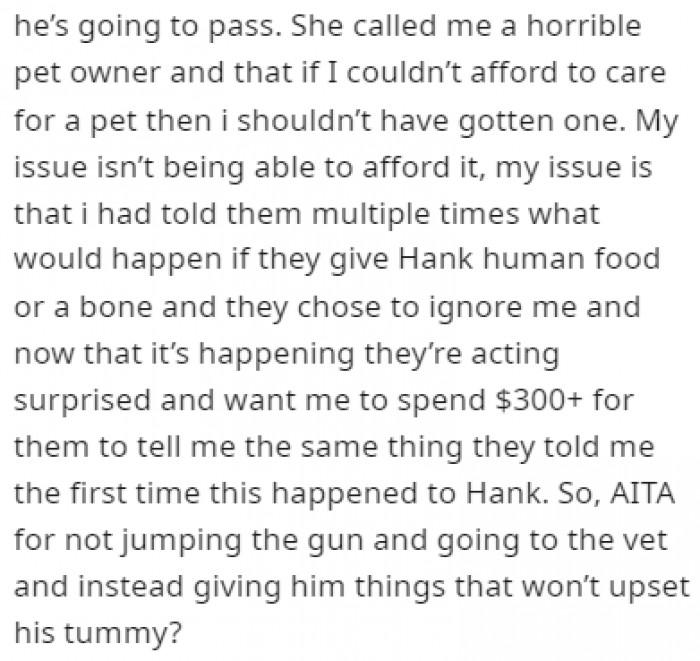
Moreover, studies in animal behavior suggest that stress and inconsistency in diet can lead to a range of behavioral issues in dogs.
This underscores the need for family consensus on feeding practices to promote the dog's health and reduce unnecessary stress for both the pet and the owner.
Moreover, the emotional implications of a pet's health can significantly impact their owners. A clinical psychologist might argue that when owners see their pets in distress due to diet-related issues, it can lead to feelings of guilt and frustration. Research shows that these emotions can complicate family dynamics, particularly when differing beliefs about pet care practices arise.
He needs a vet
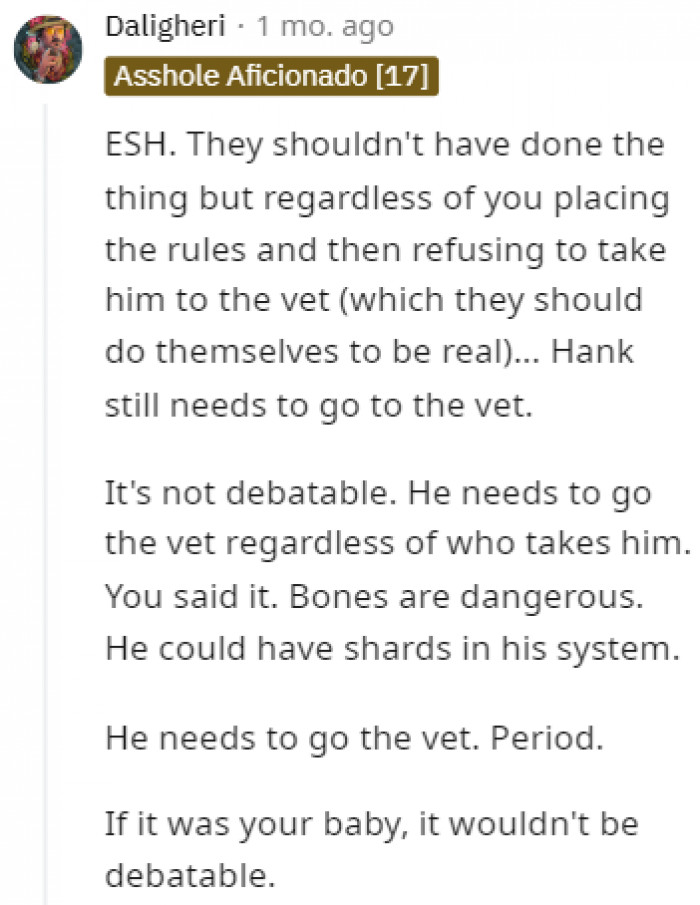
Easy to say who's to blame here
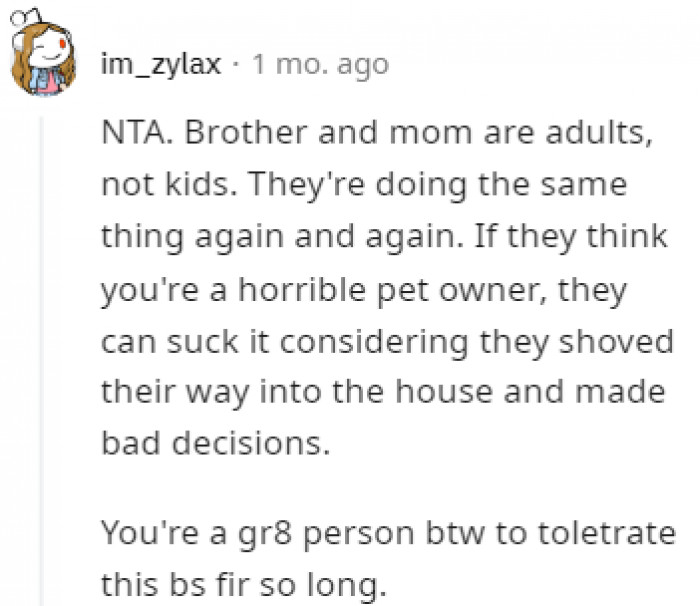
Limit their contact with the dog
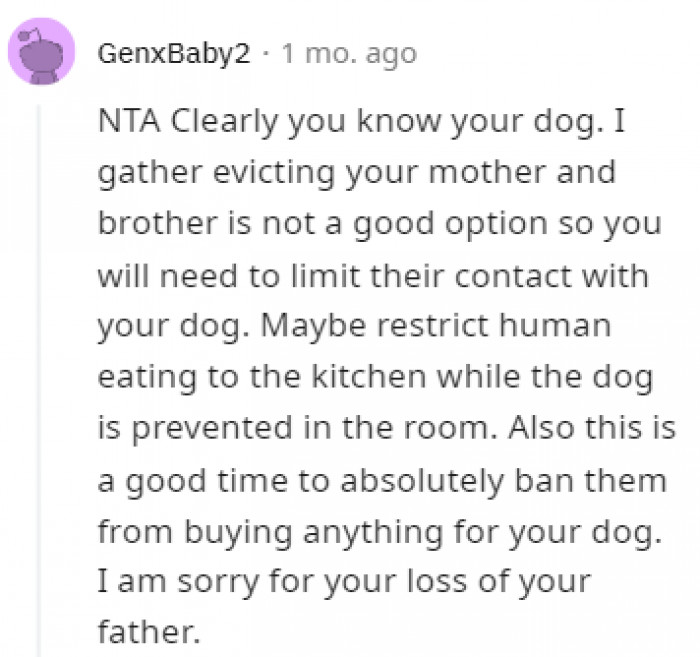
Navigating Family Responsibilities
Family dynamics often complicate pet care decisions. Research published in the National Institutes of Health emphasizes that clear roles and responsibilities can help reduce conflicts regarding pet care.
In this case, it seems that the family may not have established a mutual understanding of the dog's needs, leading to potential misunderstandings.
The Importance of Family Collaboration in Pet Care
Collaborative approaches to pet care are essential for ensuring that all family members are on the same page, particularly when it comes to dietary needs. A family therapist might recommend regular family meetings to discuss pet care strategies, which can foster understanding and cooperation. Research indicates that when families engage in open dialogue, they are better equipped to manage conflicts that arise concerning shared responsibilities.
Creating a shared understanding of the dog's dietary needs can alleviate stress and improve the pet's quality of life.
A sound plan!
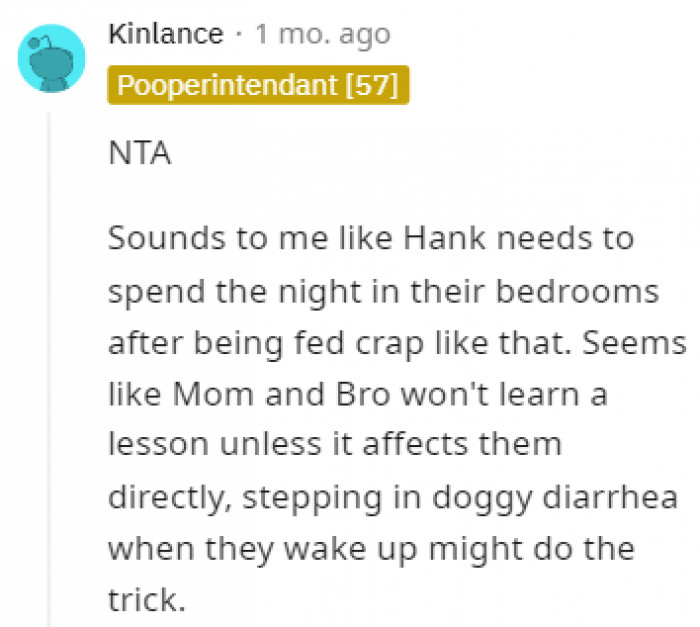
The actions of her family members show disregard for her feelings and wishes, which ultimately causes her pet to have an upset stomach. She needs to assert herself and advocate for what she believes is best for her dog and herself, or else something like this will happen again.
The comments on this thread were mixed in opinions, and now it's your turn to share yours.
Additionally, involving a veterinarian in discussions about the dog's dietary needs can provide an objective perspective that supports informed decision-making. Research shows that when families seek professional guidance in pet care, they often experience better outcomes and reduced conflicts.
Psychological Analysis
This situation reflects the critical need for clear communication in shared pet care responsibilities. The Redditor's concerns about dietary choices show a deep commitment to their dog's health. Encouraging family dialogue about dietary restrictions can help create a harmonious environment for both pets and their owners.
Analysis generated by AI
Analysis & Alternative Approaches
In conclusion, ensuring a pet's health requires careful consideration of dietary needs and open communication among family members. Research demonstrates that collaborative approaches in pet care can enhance relationships and improve outcomes for pets. As highlighted in the Veterinary Record, understanding each pet's unique requirements is vital for their well-being.
A practical approach could involve creating a family discussion about the dog's dietary needs and establishing guidelines for feeding practices.
Encouraging everyone to share their perspectives can help create a more cohesive plan that aligns with the dog's health requirements.
The Importance of Communication in Pet Care
Effective communication is vital in ensuring that all family members are on the same page regarding pet care. Research shows that misunderstandings can arise when families do not have open dialogues about their pets' needs.
In this scenario, fostering a culture of communication can help reduce frustration and promote a more harmonious environment.
Encouraging family members to voice their concerns and suggestions about pet care can lead to better collaboration and understanding.
This approach can help everyone feel valued and appreciated, ultimately benefiting the dog's well-being.
Creating a Supportive Family Environment
A supportive family environment is essential for both human and animal well-being. Research indicates that families who work together to care for pets foster stronger bonds and reduce stress.
In this case, prioritizing the dog's health can enhance the family's overall dynamic, creating a sense of unity.
Practical strategies could include establishing a pet care schedule that outlines each person's responsibilities, ensuring everyone is aware of their roles in the dog's care.
This way, the family can work in unison to support the dog's health while also reducing conflict.
Analysis & Alternative Approaches
In conclusion, effective communication and understanding of pet care needs are crucial in fostering healthy family dynamics. By working together and prioritizing the well-being of their dog, families can reduce conflicts and enhance their overall relationships.
The ultimate goal should be to create a supportive environment where pets and family members feel valued and cared for.



